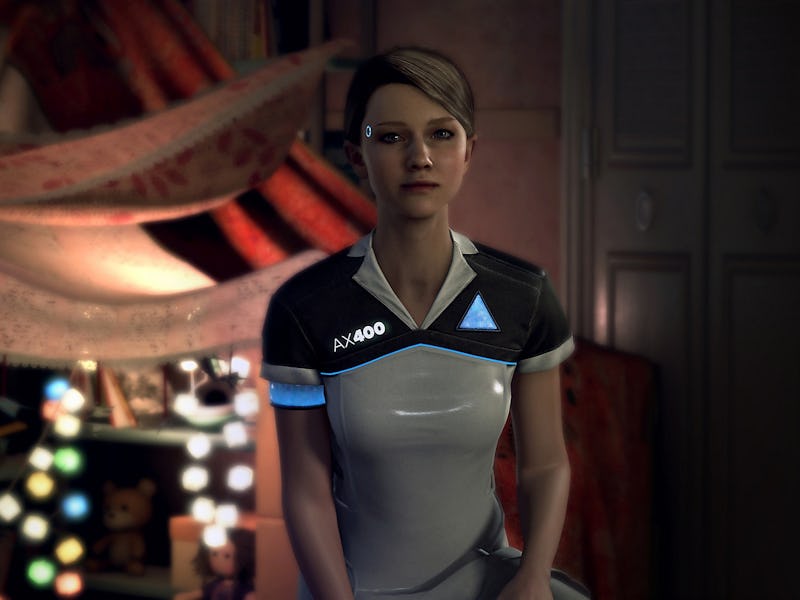'Detroit: Become Human' Is a Beautifully Imperfect Game About Our Future
At times beautiful and other times tone-deaf, 'Detroit: Become Human' is a game at odds with itself.

About thirty minutes into Detroit: Become Human, I found myself playing the piano for a very wealthy but very kind old man. I was his android servant, and after serving him breakfast, he asked I occupy the time until he finished his bacon and eggs. So, I went to his piano.
Tapping the PlayStation 4 touch pad at rhythmic intervals, out came a beautiful sonata that played against a breathtaking digital sunrise. Cinematically, it was a simple image, but emotionally, it was a complex maze I’ve not felt from a narrative video game in years. I was prepared for all that Detroit: Become Human had in store, with all the questions about existence and sentience you expect from a grounded science-fiction story. But by the end, my feelings toward Detroit were as conflicted as a robot asking if it were alive.
Minor spoilers for Detroit: Become Human ahead.
At times beautiful and sometimes tone-deaf with its metaphors, Detroit: Become Human is a single-player narrative video game about the future that says nothing new about it. But it’s still a great game, possibly one of the best of the year, whose only shortcomings are its ambitions. Set in a near future Detroit — a city historic for economic mobility halted by innovation — lifelike androids are sold as consumer products. They do your chores, tutor your kids, and even serve as company. Naturally, androids have disrupted a vast majority of working-class industries, leading to a complicated future where the world is moving forward while a populace remains running in place.
Connor (played by Bryan Dechart) in 'Detroit: Become Human' for the PlayStation 4.
Players experience the game through the POV of three androids: Connor, a prototype in a pilot program for police detectives; Kara, a rebooted caretaker for a low-income family; and Markus, the ex-servant of a wealthy philanthropist. The three stories intersect at key moments, and the decisions made by each character — in particular Markus, who leads an uprising that influences public perception of androids — can imbue the other journeys with more danger and difficulty. And yes, if a character dies, they die, and the story moves forward without them. (The exception being Connor, whose semi-frequent deaths and reboots is part of his story.)
The game’s novelty of an immersive, cinematic experience is nothing new for French studio Quantic Dreams and director David Cage. Twelve years ago, Quantic and Cage wowed gamers with Heavy Rain, a mystery noir with the same formula that was a revelation in 2006. But the shortcomings of the genre became clear in 2013, with the underwhelming Beyond: Two Souls. With Detroit: Become Human, Quantic has hardly perfected its formula, but the fictional universe players dive into here is more fertile ground for Quantic’s brand of storytelling. If a game like Detroit feels like the future, that’s because the world you spend nearly 40-50 hours exploring literally is the future.
What threatens Detroit, however, is a regressive tone-deafness that’s at odds with its progressivism. Predictably, the androids you meet in Detroit have a warmer soul than most humans. Androids fall in love and protect those they care for, humans dispose of everything around them. This might render Detroit derivative, like Blade Runner crossed with X-Men (Markus is totally Magneto here), but thanks to the Quantic packaging, the game can succeed as an engaging alternative over passive mediums like books and movies. And most times, it does, until it hits a brick wall.
Lance Henriksen (left) and Jessie Williams (right), as characters in 'Detroit: Become Human.'
By pursuing a “robots are persecuted minorities” metaphor, the game produces some of the most cringe moments in recent memory. At one point, players lead a protest with a hundred other “Deviant” models. In the same way that one Call of Duty had players “Press X to pay respects” at a funeral, pressing “X” to choose chants like “WE ARE ALIVE” or “NO MORE SLAVERY” (oof) is difficult to swallow. As real minorities in America still struggle to live free with dignity and enjoy basic rights, the metaphor threatens to undercut Detroit at its core. This is unfortunate, as the game is otherwise very intelligent about its story and the emotions it imbues within its inhuman characters.
It’s in the characters that truly defines Detroit, an ensemble group who elevate the game to potential Game of the Year candidacy, tone-deafness aside. Because I loved the characters in Detroit. I cared for their well-being. I panicked whenever danger reared its head, and I got anxious whenever the other characters reacted negatively to my decisions. I’ve already said the androids feel more alive than humans, but the interactivity adds a dimension absent in any episode of Westworld. Detroit is truly one of the most ambitions games I’ve ever played, but it makes grave mistakes. To err, after all, is human.
Detroit: Become Human is available now.